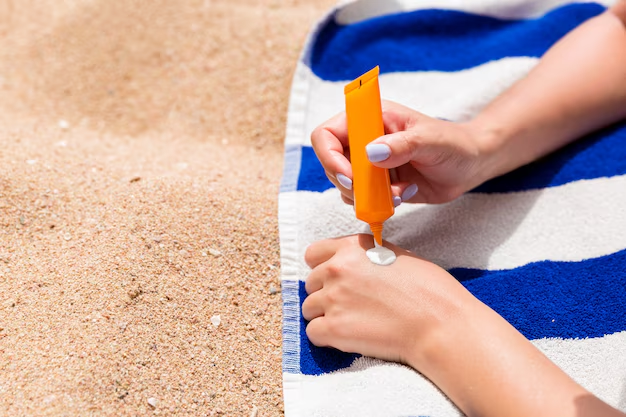Could Sunscreen Actually Be a Threat? Here's What You Need to Know
When the sun is shining, and skin needs protection, many people reach for sunscreen without a second thought. But lurking in some corners of the internet is a controversial question: Could sunscreen itself cause cancer? This question touches on the concerns about chemical ingredients and their potential long-term effects. Let's dive into the complexities surrounding sunscreen usage, its benefits, potential risks, and everything else you need to consider.
Understanding Sunscreen: More Than Just Sun Protection
What Is Sunscreen?
At its core, sunscreen is a topical product designed to protect skin from the sun's harmful ultraviolet (UV) rays. Sunscreens typically contain organic molecules (chemical filters) or inorganic substances (physical filters) that either absorb or reflect UVA and UVB rays.
Chemical Sunscreens: They work by absorbing UV radiation and converting it into heat, which is then released from the skin. Common ingredients include oxybenzone, avobenzone, and octinoxate.
Physical Sunscreens: These use minerals like zinc oxide and titanium dioxide to physically block and reflect UV rays. They tend to be less irritating and are recommended for sensitive skin.
The Importance of Sun Protection
Skin cancer is one of the most common types of cancer globally. Protecting skin from UV exposure can significantly reduce the risk of developing skin cancer, premature aging, and sunburns. Dermatologists universally agree on the importance of using sunscreen as a preventive measure.
The Concern: Can Sunscreen Cause Cancer?
What Fuels the Fear?
The worry about sunscreen causing cancer primarily stems from the presence of certain chemical ingredients, particularly oxybenzone. Some studies have suggested that these chemicals can penetrate the skin and mimic hormones, potentially disrupting endocrine functions. However, the data on this is not conclusive.
Oxybenzone and Its Reputation: Oxybenzone has been at the center of controversy due to its ability to absorb into the bloodstream. It has weak estrogenic activity, which rings alarm bells for some, but extensive research is still needed to fully comprehend its long-term implications.
What Do Experts Say?
The consensus among health organizations and dermatologists is that the proven benefits of sunscreen in preventing skin cancer far outweigh the theoretical risks of chemical exposure. As of now, there is no concrete scientific evidence linking sunscreen use to cancer in humans.
Navigating the Sunscreen Aisle: Making Informed Choices
Look for Broad Spectrum Protection
A sunscreen labeled as "broad-spectrum" protects against both UVA and UVB rays. UVB rays are primarily responsible for sunburn and play a significant role in skin cancer development, while UVA rays contribute to skin aging and can also promote cancer.
Opt for Higher SPF
The Sun Protection Factor (SPF) measures how well a sunscreen protects against UVB rays. Dermatologists recommend using a sunscreen with at least SPF 30, which blocks about 97% of UVB rays. Higher SPFs can offer slightly more protection and are beneficial for those spending extended periods outdoors.
Mineral vs. Chemical: Weigh the Pros and Cons
Mineral Sunscreens:
- Pros: Better for sensitive skin, less likely to cause irritation or allergic reactions, more environmentally friendly.
- Cons: Can leave a white cast, especially on darker skin tones.
Chemical Sunscreens:
- Pros: Easier to rub in without a visible residue, often feels lighter on the skin.
- Cons: Potential for skin irritation, concerns about ingredient safety.
Navigate the Ingredient List
When selecting sunscreen, consider the ingredient list:
- Avoid Oxybenzone if you're concerned about its safety, though current data is not conclusive.
- Choose Products Without Fragrance or parabens if you have sensitive skin.
- Consider Water Resistance if you'll be swimming or sweating.
Beyond Sunscreen: Other Sun Safety Tips
Wear Protective Clothing 👒
Hats, sunglasses, and long sleeves can offer additional protection against sun exposure. Look for clothing with UV protection labels, which are increasingly available.
Seek Shade ⛱️
Whenever possible, stay in the shade, especially between 10 a.m. and 4 p.m. when the sun's rays are the strongest. Use umbrellas or canopies for additional coverage.
Be Mindful of Reflected Light 🌊
Sand, water, and snow can reflect UV rays, increasing exposure. Take extra precautions in these environments to avoid additional sun damage.
Innovations in Sun Protection: What’s on the Horizon?
Eco-Friendly Formulations
With rising concerns over coral reef damage, many sunscreen manufacturers are turning towards reef-safe formulations that exclude harmful chemicals like oxybenzone and octinoxate.
Advanced UV Sensors
Technology is making it easier to monitor UV exposure. Wearable sensors can now notify users when it's time to reapply sunscreen, offering a smart approach to sun safety.
Closing Thoughts: Empowering SunSmart Decisions
The question of whether sunscreen can cause cancer doesn’t have a straightforward answer yet, but the importance of sun protection remains clear and undeniable. With a mindful approach to selecting and applying sunscreen, along with adopting other sun safety measures, individuals can enjoy the sun while minimizing risks.
🌞 Quick Sun Safety Tips:
- Choose Broad-Spectrum sunscreen for comprehensive protection.
- Opt for SPF 30 or higher to shield against UVB rays.
- Consider mineral options if you have sensitive skin.
- Avoid peak sun hours and seek shade.
- Layer protection with hats and UV-rated clothing.
- Stay informed about emerging sun safety innovations.

Related Articles
- Are Breast Cancer Lumps Painful
- Are Chills a Sign Of Cancer
- Are Colon Spasms a Sign Of Cancer
- Are Lytic Lesions Always Cancer
- Are Polyps Cancer
- Can a Blood Test Detect Cancer
- Can a Ct Scan Detect Cancer
- Can a Dexa Scan Show Cancer
- Can a Gastric Emptying Scan Show Cancer
- Can a Lung Biopsy Cause Cancer To Spread
